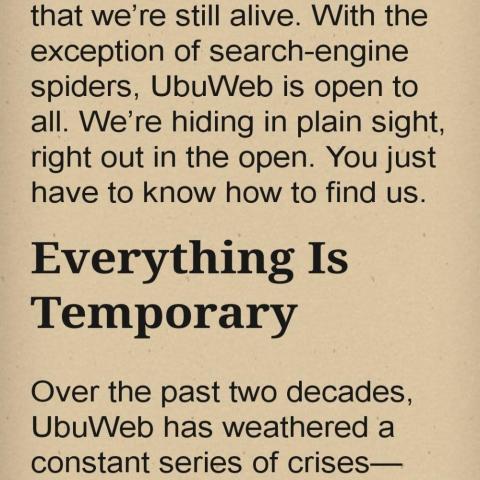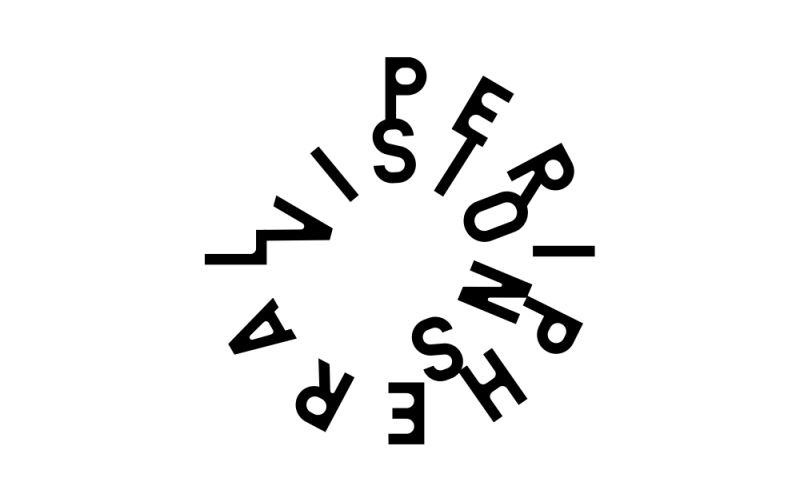Ubu@50: Everything Is Temporary, the electronic publication

Ubu@50: Everything Is Temporary
A readymade gesture
Marcel Duchamp, one of the founders of avant-garde, in 1935 at the Councours Lépine, an innovation fair, exhibited a series of objects under titled *Rotoreliefs* – twelve cardboard litography discs with spiral motifs in the lithography technique. When rotating *Rotoreliefs* would engender optical illusions. Although he received an honorable mention in the category of industrial art for his exhibit, the product itself turned out to be unsuccessful: he sold two discs to friends and one to a visitor. Duchamp initially produced 500 sets of *Rotoreliefs*, of which 300 disappeared in the Second World War, while rare examples were preserved for posterity.
UbuWeb (ubu.com) is the largest online archive of avant-garde art. The electronic publication *Ubu@50* contains texts about UbuWeb, a digital library of references used in the texts and a complete archive of UbuWeb.
Fragile archives
UbuWeb celebrated its 25th birthday two years ago. Since the advent of the Internet as a global mass medium, the American conceptual artist Kenneth Goldsmith himself, using rudimentary HTML code and without asking permission, has collected, organized and provided access to otherwise difficult-to-access works of experimental film, video art, contemporary theater, conceptual poetry and concrete music. Years before museums and archives of contemporary art began to digitize material from their depots, Ubu was a place to discover important works of cultural history and potentially the cultural future. However, in times of digital platforms, surveillance and intellectual property restrictions, precious archives like Ubu can disappear overnight. As Custodians.online once wrote in a birthday card for Ubu’s 20th:
> Everything is temporary, even after 20 years. Servers crash, disks die, life changes and shit happens. Care and redundancy is the only path to longevity.
In the greeting card, we, people who care, are invited to find our own Ubu. The fragility of precious archives requires us to mirror each other in solidarity. Distributed technologies are solid in automating the allocation of resources in the world of corporate services. However, in that world, the fate of the shared resources is destined to depend on technological giants. The resilient shared archives that we care about are, on the contrary, distributed with simple gestures and technologies that have served us for decades. Distributed networks of services need machines, distributed networks of cultural artifacts need people.
Ubu@50
With Ubu@50, we ask what the future should look like to allow Ubu and other autonomous digital archives to survive over the next quarter of a century. What kind of future can we imagine for avant-gardes under the conditions of ubiquitous digital infrastructures, intensive application of artificial intelligence and technological responses to social and ecological crises? And vice versa, what kind of future can we imagine for societies from the perspective of sustainable use of technologies, radical avant-garde gestures and the commons as they were created in digital culture over the previous quarter of a century?
Interview with Vuk Ćosić:
Ubu@50 – 50Ubus is part of the Multimedia Institute’s programme “Public Library” and an activity within project “Peripheral Visions” – a partner project organized by EIPCP, Kontrapunkt, Kuda.org, Kulturtreger, Maska and Multimedia Institute with the support of the European Union. The “Public Library” programme is supported by the Ministry of Culture and Media of the Republic of Croatia.
“Financially supported by the European Union. The views and opinions presented in the project are the views and opinions of those who express them, and not necessarily the views and opinions of the European Union or the European Agency for Education and Culture. The European Union and the Agency are not responsible for them.”

